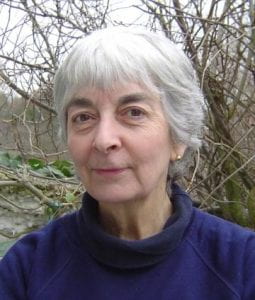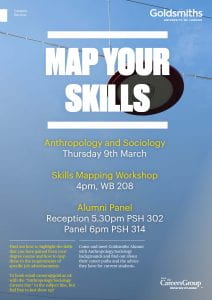Written by Professor Pat Caplan & Sifa Mustafa
Emeritus Professor Pat Caplan, Department of Anthropology, will be delivering the annual Mary Douglas Memorial Lecture at the University of Oxford on Wednesday 24th May entitled: Gifts, entitlements, benefits and surplus: interrogating food poverty and food aid in the UK

Tell us a little bit about the annual Mary Douglas memorial lectures and how you have become involved
The anthropologist Professor Dame Mary Douglas died in 2007, after writing over 20 books and numerous articles, and teaching in both the UK and the USA. Her interests were wide and varied: symbolism and cosmology; pollution and taboo; consumption and communication; perception; risk and danger, trust and blame; economy and social policy; boundaries, inclusion and exclusion. She sometimes drew on her own early fieldwork in the Congo, but she also made much use of the Old Testament, especially in the latter part of her life. While she published acclaimed academic works, many of which were read and cited outside of her discipline, she also frequently wrote for a lay audience in such venues as the Times Literary Supplement. In this respect, she was also a public intellectual.
The Memorial lecture was set up four years ago as a joint venture between University College London, where Mary Douglas taught for many years, and the University of Oxford, where she originally trained. Its purpose is to present anthropological issues, particularly those which interested Douglas, to a lay audience. Two of the previous lecturers, Paul Richards (2014) and Michael Thompson (2016), were originally students of Douglas at UCL. I was not, but perhaps it’s noteworthy that I am the first woman to give the memorial lecture. I was told that the reason for inviting me was that I had worked on some of the same themes, notably food and risk.
Could you tell us about the lecture you will be delivering on 24th May?
I pose an ambitious question: what constitutes the good society? Is it one in which the state takes primary responsibility for the welfare of its citizens, or one in which the duty of care is handed over largely to the private and/or third or voluntary sectors? How can anthropologists contribute to the debates surrounding such questions? To address them I examine the case of food poverty in the UK and the solutions presently on offer. As Douglas noted, food is never just feed, and in order to comprehend some aspects of the contemporary situation we must attempt to grasp how a range of institutions such as food banks, the food industry and the state ‘think’ about food poverty, what they do about it and why, and how these actors are inter-related
Has Mary Douglas’ work influenced any of your own research?
Like virtually all anthropologists I have long been familiar with her two early and famous books: Purity and danger: An analysis of concepts of pollution and taboo (1966) and Natural Symbols: Explorations in Cosmology (1970). In the course of writing this lecture, I’ve read more of her work, but because she has an assiduous intellectual executor, Richard Fardon, even more books have appeared since her death, while another written by three of her ex-students is currently in press!
When I was teaching fulltime at Goldsmiths I set up a course on the anthropology of food which ran for a long time. Here I made much use of Douglas’ work on the topic, one to which she kept returning in different contexts. She was adept in making use of and analysing the most mundane aspects of food, such as a witty article written with one of her students, Michael Nicod, ‘Taking the biscuit’ which was published in the New Statesman in 1974.
Later, I developed an interest in risk arising out of my research on the social effects of BSE and organised a seminar series which was later published a book (Risk Revisited 2000). The ‘revisited’ part of the title was because the contributors to this edited collection all made use of but also critiqued Douglas’ work on risk. Sadly, she had turned down our invitation to contribute a chapter herself because she said she wanted to focus on her Old Testament work.
Can you highlight how anthropologists can contribute to bringing these debates to the forefront of public consciousness?
One of the problems with much academic research is that it is primarily written for and read by other academics. That’s all well and good, but we need to find ways of communicating with a wider audience through a variety of media: newspapers, websites, blogs, short articles in magazines, film-making and of course teaching. We should be asking ourselves ‘what is our research for and who is it for?’ Is it going to make a difference not only to us and our discipline but also to other people, including those whom we’re researching?
What advice would you give to Goldsmiths students who are currently looking into similar research themes?
I think I’d want to say to a student as follows: first read (critically of course) as much of the literature on the topic as possible, then think about how you want to address the questions which it raises. Is this through the use of ‘big data’ or through more ethnographic approaches at the micro-level? Or both? It’s good to do some original research but you want to be sure you are not just re-inventing the wheel!
Learn how to practice active listening, with lots of open-ended questions. Think about how you can connect the lives of the people you talk to with wider social contexts. Don’t be afraid to follow your nose and see where the data lead you, which may be a different place from where you started.
For more information, see the talks’ flier
The School of Anthropology and Museum Ethnography presents the Mary Douglas Memorial Lecture, Wednesday 24th May 2017, 18:00, Mary Ogilvie Lecture Theatre, St Anne’s College 56 Woodstock Road, Oxford OX2 6HS
For queries or to register to attend please contact: stacey.richardson@insis.ox.ac.uk
